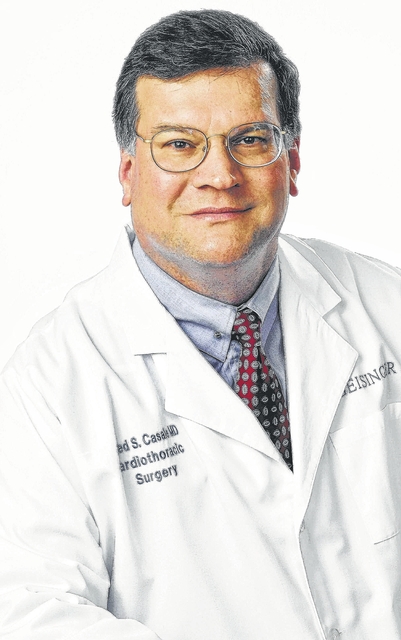To Your Health: The Difference Between A Heart Attack And Cardiac Arrest

Alfred Casale To Your Health
It’s either one of my most admirable or most infuriating characteristics. Spin it positively and it’s why I’m a good surgeon; spin it negatively and it’s the cause of one of my and Mary’s standard disagreements.
I’m persnickety, says her. I’m precise, says me.
Getting it right, not close, but right, matters. Choosing the right word, straight lines, accurate statements, correct recollections, careful differentiation between opinions and facts; all these make a difference to me.
OCD? I don’t think so. Fussy? Yes. Demanding? Certainly. Paralyzed by it? Not at work, rarely at home, never on the trout stream.
I believe in science. I trust the scientific method when applied carefully, rationally and with a large dose of skepticism. Empirical evidence must be accommodated in an argument, not ignored. I’m particularly cranky when people disregard solid, carefully curated data or believe sloppy, shoddy data. If there’s a compelling political or other reason to make a choice in policy that ignores or is at odds with the science, that may be OK, but admit it, don’t pretend the science or facts are not true.
Imprecision in the use of medical terms can, at best, be confusing and, at worst, dangerous.
You may have heard the terms “heart attack” and “cardiac arrest” used interchangeably, whether from a friend, your favorite medical drama or a movie. But they’re terms for two very different medical conditions that affect the heart.
A heart attack is when blood-flow through the coronary arteries, the heart’s fuel lines, is unable to satisfy the heart muscle’s demands for oxygen and fuel. This can occur for many reasons, the most common, when the coronary arteries become clogged because blood elements gel at the site of a plaque or fatty deposit, that has ruptured, exposing its sticky interior material and solidifying the passing blood.
Another type of heart attack occurs when a tightly narrowed coronary artery can’t allow enough blood to flow by at a time when exercise, stress, or other events demand more work from the heart than the resting fuel supply can support. We’ve all had a car that runs great at idle, but step on the gas to speed up and the thing stalls or sputters. Heart attacks while shoveling heavy snow are often of this variety.
During a heart attack, the heart muscle is starved to death. How much dies, how able neighboring cells can pick up the slack, is key to determining short-term survival and long-term disability. It’s why rapid attention at a heart center is so important.
In cardiac arrest, the heart’s main function, circulating blood to all the body’s organs, suddenly is compromised. Usually because of a sudden problem with the heart’s electrical system but it can be from certain catastrophic mechanical events like big blood vessels rupturing or the heart being strangled by fluid building up around it in the heart sac or pericardium.
With a cardiac arrest the whole body starts to starve to death as lack of blood circulation keeps oxygen and fuel from getting to all organs and tissues, not just to the heart. It’s why cardiac arrest kills in minutes.
What’s the connection between the two? The most common cause of cardiac arrest is a dangerous irregular, uncoordinated heart rhythm that occurs when starving heart muscle cells, in their death throes, become electrically irritable and take over pacing responsibilities from normal heart cells.
Symptoms of a heart attack usually include chest discomfort, pain in the left arm, shortness of breath or trouble breathing, nausea and vomiting and a sense of impending doom.
During cardiac arrest, the heart suddenly stops pumping blood to different parts of the body and you collapse as your pulse and breathing stop. Immediately before this, you might feel chest pain, dizziness or have trouble breathing, but not for long, you’re about to pass out.
Some people who go into cardiac arrest don’t experience any symptoms, and the medical term for this is sudden cardiac death.
Every second counts when someone goes into cardiac arrest.
If you believe someone is having a heart attack or has gone into cardiac arrest call 911 immediately. In the case of cardiac arrest, performing cardiopulmonary resuscitation (CPR) can help save a life until medical help arrives by keeping blood flowing to the brain.
The best way to prevent both a heart attack and cardiac arrest is to take good care of your heart. We’ll keep talking about this, especially in February, heart month.
Dr. Alfred Casale is chairman of surgery for the Geisinger Heart Institute, co-director of the Cardiovascular Service Line for the Geisinger Health System and Associate Chief Medical Officer of the Geisinger Health System and Chair of the Geisinger Heart Institute. Readers may write to him via ae@timesleader.com.
Story Credit: http://timesleader.com/features/630358/to-your-health-the-difference-between-a-heart-attack-and-cardiac-arrest


